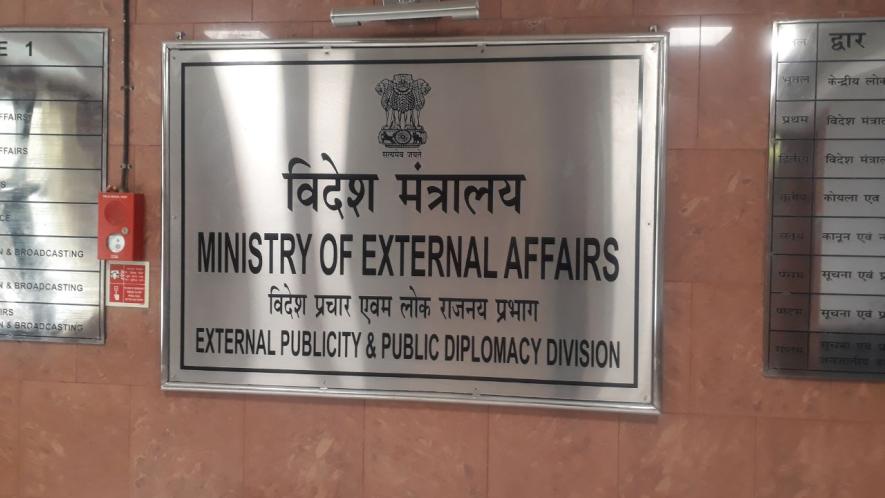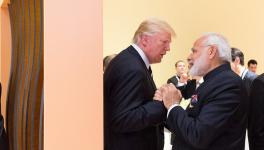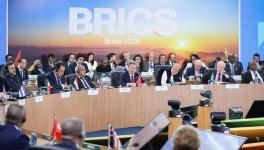Why is Indian Foreign Policy Facing Strategic Disarray?

Image Courtesy: Wikimedia Commons
The confluence of recent events in international political economy, including the unilateral imposition by the US government of 25% tariffs on Indian goods, punitive measures over India's energy and defence ties with Russia, additional anti-India measures by the US government on account of India being a member of BRICS, sanctions targeting Indian entities in Iran's oil network, and the public denigration of India and Russia as 'dead economies', reveals a profound crisis in India's strategic autonomy under the Bharatiya Janata Party-led Union government.
This crisis stems from two interconnected failures: a self-inflicted vulnerability to US imperialist hegemony due to the failure to have balanced relations with the rest of the world; a duplicitous acquiescence to US imperialist hegemony masked by performative 'decolonisation'. The overcoming of this strategic disarray demands a fundamental reorientation toward authentic strategic autonomy premised on a political break with the neo-fascist ruling dispensation.
Self-Inflicted Strategic Vulnerability
Indian governments since 2014 (led by the BJP) seem to premise their foreign policy on two non-factual presumptions. First, US imperialist hegemony is incontestable (unipolar moment) and, therefore, the only strategic option available is to seek an accommodation with this hegemony, hopefully with the least possible unfavourable terms.
Second, once the unipolar moment was well and truly over, the Indian government seems to have shifted to the position that US foreign policies are more congruent with Indian national interests, when compared to other great powers.
The resulting strategic ambiguity of the BJP-led Union government with respect to China has boxed India’s foreign policy into a corner. In fact, China remains India’s largest trading partner and a potential source of large-scale greenfield foreign direct investment. This strategic ambiguity has allowed the US to exploit this self-inflicted vulnerability exemplified by US President Donald Trump’s repeated claims that the US instituted a ceasefire between the armed forces of India and Pakistan in the recent days-long conflict (that remains uncontested by the Indian Prime Minister).
Beyond the blanket 25% tariff imposed on Indian exports to the US (which are higher than those imposed on Vietnam or Japan), there is an unspecified ‘penalty’ explicitly linked to India's BRICS membership and energy and defence purchases from Russia.
The US sanctions on Indian firms and individuals involved in Iran’s oil industry exemplify extraterritorial arm-twisting. Drawing on the BJP-led government's timid acceptance of previous US diktats on disassociating from advantageous oil imports from Iran and Venezuela, the US has extended its hostile actions against Indian national interests.
However, the BJP-led government has failed to learn the right lessons from Russian resilience against the economic war that was unleashed by the metropolitan capital led by the US. It was Russia’s willingness to recalibrate its economic and diplomatic relations with different countries of the world (including China) that resulted in the defeat of the metropolitan capital in this economic war.
Moreover, without strategic foresight, the BJP-led government o has largely alienated India from countries of the Global South by various measures, including dissociation from the Shanghai Cooperation Organisation’s condemnation of the US-Israeli military attacks on Iran, abstention in the United Nations General Assembly resolution that called for a ceasefire in Gaza, deceleration of de-dollarisation measures by BRICS and reluctance in reviving the Russia-India-China or RIC format for diplomacy.
Neither cosmopolitan neo-liberals nor the neo-fascists in India have been willing to address the root of this self-created vulnerability to US hegemony. The BJP-led government has been unable till now to even provide an authoritative statement rebutting any of the coercive actions of the US, including the tariff measures announced by Trump.
In an astonishing display of cosmopolitan neo-liberal poltroonery authored by those who are policy makers in the neo-fascist dispensation, a working paper was uploaded onto the website of government think-tank NITI Aayog that argued that concessions favourable to US corporate agribusiness are in India’s own interests and, therefore, must be implemented. However, in the light of intense criticism, the working paper was deleted from the Aayog’s website.
How Consent is Manufactured for Attenuation of Strategic Autonomy
India is, therefore, an appropriate example of a double act of Dr Jekyll (cosmopolitan neo-liberals) and Mr Hyde (neo-fascists) by those who are enablers of US imperialist hegemony. It is possible for different entities (individuals/organisations) to adopt one or the other guise in words while both work in different ways to manufacture consent for the attenuation of India's strategic autonomy.
The issue of the colonial phase of imperialism and the persistence of imperialism through other processes thereafter is an apt domain to understand this double act by cosmopolitan neo-liberals and neo-fascists.
Cosmopolitan neo-liberals approach this issue in the following ways: one, colonialism was purportedly either benign or not very adverse; two, even if colonialism was adverse, processes akin to colonialism had ostensibly no role in the period thereafter; three, the US government's actions since 1945 ostensibly have mostly furthered international development even if the motives of the US government were self-interested (that harks back to the invisible hand of Adam Smith) but without offering any reason for this supposedly benign outcome.
Neofascists approach the same issue in the following ways: one, hark back to a purported golden age in a segment of the pre-colonial period (selected on the basis of contemporary political considerations) that was displaced by foreign invaders in a subsequent segment of the pre-colonial period. All this while according primacy to the ostensible cultural consequences of colonialism relative to the aforementioned golden age while papering over the material realities of colonialism. This results in the drawing of a false historical analogy between the non-golden age pre-colonial and colonial periods.
Two, there are no material continuities between colonialism and the period thereafter, but what persists is ostensibly cultural servility toward foreign cultures (requiring performative decolonisation measures, such as replacing English with Hindi) and putting minorities in their place to restore the purported golden age. Three, no matter what the motives or consequences of US policies are, it will ostensibly partner India in ‘containing’ China.
Needless to say, all these six points (and further variants thereof) have little to do with the scientific disciplines of history and international political economy. These emerged during the colonial phase of imperialism and have mutated thereafter in ways that willy-nilly help manufacture consent for US imperialist hegemony.
This manufacture of consent also involves ‘debates’ between denizens of this double act, including on the current tariffs imposed by the US. But what is common to the ideological constructs of the denizens of this double act is what they agree on: processes akin to colonialism did not persist thereafter and US imperialist hegemony is preferable to any alternative.
However, the period after colonialism did not involve the end of imperialism but its continuation in other ways involving a number of processes of which two are mentioned here: first, metropolitan capital seeking to direct Global South countries in terms of political economy on trajectories that ensure that these Global South countries are compelled to supply primary commodities (farm produce and minerals) to metropolitan capital at prices that do not undermine the exchange value of money.
Two, selective relocation of economic activities in the lower and lower-middle reaches of the technological ladder that pertains to global production networks to specific areas in the Global South, especially in and around China.
Moreover, the claim that Indian national interests are congruent with US foreign policy is patently untenable. The denizens of the current Indian government (both neo-fascists and cosmopolitan neo-liberals), well known for their indifferent acquaintance with the contents of introductory courses on international political economy and history, are unable or unwilling to understand that foreign policies of great powers do not persistently align with the national interests of any other country.
Mistaking tactical congruence on this or that issue for strategic congruence will merely allow the great power in question to attenuate India’s strategic autonomy to unprecedented levels, as is happening at present with the US’s coercive measures against India. Besides, the outcome of the US trade war on China demonstrates the diminishment of US imperialist hegemony and the furthering of the contemporary international political economy towards multipolarity.
Needed, a Quest for Alternative Policy Framework
The BJP-led government's policies have created a trap whereby an unbalanced foreign policy that excessively tilts towards the US has undermined the ability to resist its coercive measures.
Why has this come about? At one level, and as previously argued, this denouement is a consequence of an unscientific appraisal of contemporary international political economy. But at a deeper level it is also a consequence of Indian monopoly capital’s entanglement (involving varying degrees of malefaction even under existing laws) with metropolitan capital (including US-centred international finance), including those segments of Indian monopoly capital that are proximate to the neo-fascist ruling dispensation.
Therefore, the quest for an alternative policy framework that is rooted in authentic strategic autonomy will require a political reckoning with the neo-fascist ruling dispensation along with a critical interrogation of this double act by neo-fascists and cosmopolitan neo-liberals. This alone will thwart Indian national interests from being undermined by coercion by the US.
The writer is Professor, Department of Economics, Satyawati College, University of Delhi. The views are personal.
Get the latest reports & analysis with people's perspective on Protests, movements & deep analytical videos, discussions of the current affairs in your Telegram app. Subscribe to NewsClick's Telegram channel & get Real-Time updates on stories, as they get published on our website.
























